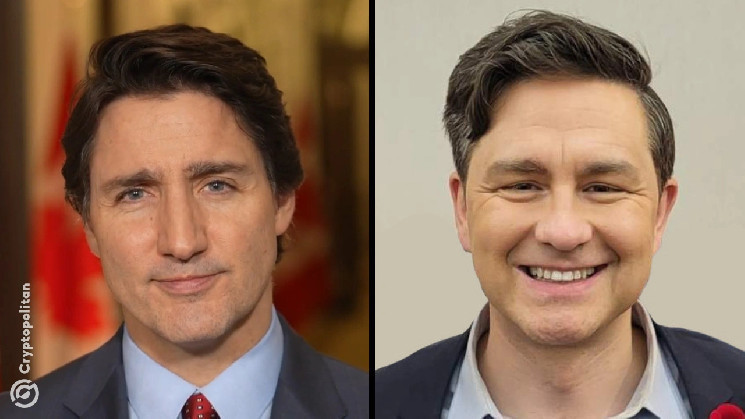Justin Trudeau’s resignation on January 6, 2025, opens the door for Conservative leader Pierre Poilievre, with an 87% chance of becoming Canada’s next Prime Minister, potentially leading to a major shift in Canada’s approach to cryptocurrencies.
On 6 January 2025, Canadian Prime Minister Justin Trudeau announced that he would step down from the position, ending almost a decade of running the country.
He wanted to change because his party had some problems with him. This means that a new prime minister, who may favor cryptocurrency, can take over the position.
Poilievre is actually the leader of the Conservative Party and is considered the front-runner for the position of Prime Minister of Canada. A Polymarket has said that he stands at a victory possibility of 87%. This high probability indicates that a large number of voters support him and have shared his opinion on digital currencies.
Poilievre’s stance on cryptocurrencies
Poilievre supports cryptocurrencies and he is against the idea of digital currencies from the central bank. He believes that Canadians should be free to use their money as they want, and the government should not interfere. He has gained many supporters like how Trump got in the U.S through cryptocurrencies.
The resignation of Trudeau will bring major changes in the management of digital assets in Canada. The government was not in favor of digital currencies during Trudeau’s tenure.
For example, his government banned 34 crypto wallets associated with the 2022 Freedom Convoy protests. This move attracted much criticism from the crypto community and even gained much attention during the U.S. elections.
With Poilievre at the helm, this may change things a bit because the country could begin to welcome cryptocurrencies more. Things are governed slightly differently in Canada as it isn’t managed on a national scale, like with the U.S., and its Securities and Exchange Commission, or SEC.
So, the new prime minister most likely won’t be able to wield much influence in digital assets, and cryptocurrency in Canada is handled through provincial regulators.
Other potential people to replace Trudeau include Mark Carney, a former governor of the Bank of Canada, but also one who has served as the governor of the Bank of England.
Carney contended that tokens are not just values. He restates that stablecoins are very important when regulated correctly. He said he doesn’t want to be in public office now, but he is aware of finance, and he does know about cryptocurrencies. This will be very helpful to him in the future when he seeks political positions.
Upcoming federal election in October 2025
The next federal election in Canada will take place in October 2025. Pierre Poilievre is doing well as many Canadian voters like him, and some people in the United States appreciate him because his ideas are similar to those of President-elect Donald Trump.
He strongly opposes the digital currency that the central bank is planning to issue, but he supports cryptocurrencies and could be a leader with new ideas in Canada’s digital asset market.
The Polymarket shows that the chances of Poilievre becoming Prime Minister have changed a bit but are still quite strong. The chances were at 93% at first, and now they are steady at 87%. The reason for this strong belief is the clear policies of Poilievre and the high interest among Canadian voters for change.
Many countries and governments around the world are also thinking about adding Bitcoin to their national reserves. It’s already begun for countries like El Salvador and Panama.
This is because people now view Bitcoin as a way to hold value and protect themselves against inflation. It may also introduce Bitcoin into Canada’s national reserve if Poilievre does become Prime Minister.
That would be progress as it would mean that Bitcoin not only becomes more accepted but would also show how cryptocurrencies are growing in regular finance.
Accepting Bitcoin reserves would put Canada at the forefront of the digital asset movement, bringing more investment and new ideas in blockchain technology. This would also mean more financial freedom and security for Canadians, which Poilievre supports because he aims to protect privacy and promote economic freedom.
Justin Trudeau’s resignation closes one chapter and hopefully starts a new one for Canada and its digital assets. The future does look bright for the supporters of cryptocurrency in Canada with Pierre Poilievre leading the Conservative Party and doing all right so far.
A new conservative government may open the door to Bitcoin reserves which would be an important shift in the psychology of the country concerning digital currency. As the election drawsnear, peoplearepayingattention to how this change will impact Canada‘s money and technology.

